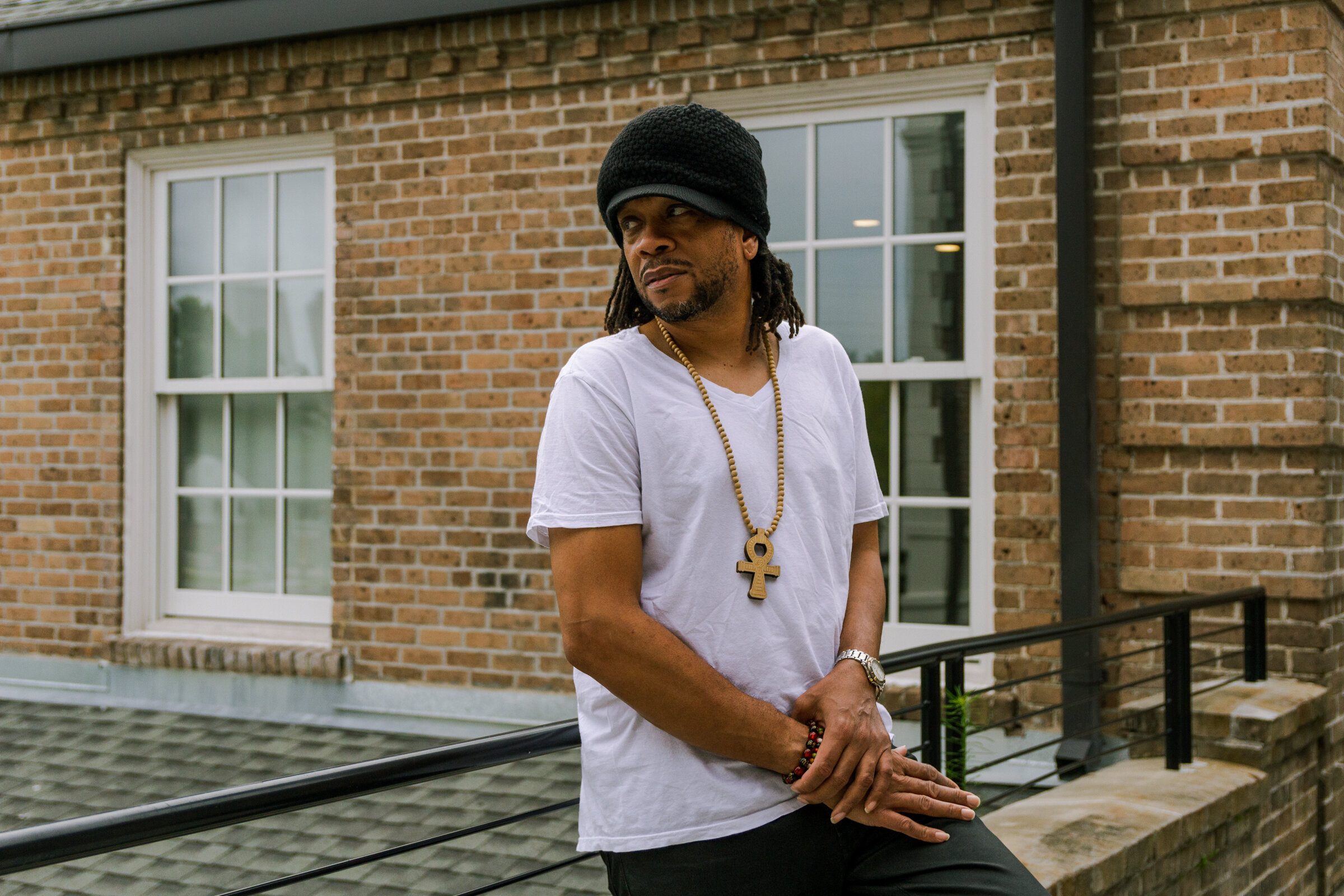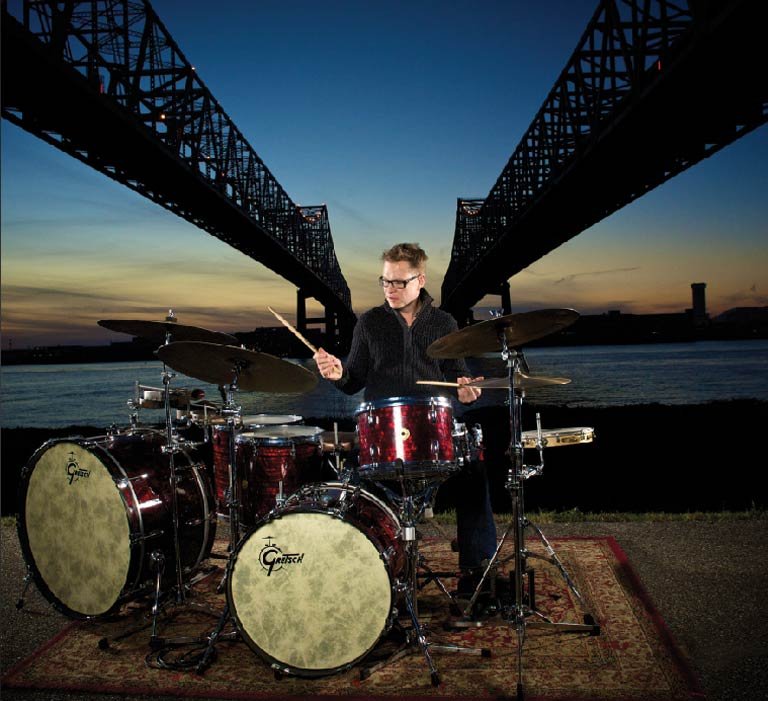Songs in the Key of Resistance

Unscripted, by Victoria Conway
Emcee/spoken word artist Unscripted prompted listeners to walk out when he first performed “Hey Racism.” At a Take’ Em Down NOLA rally, the piece helped him find his place in the moment.
That’s why the protests. That’s why the marches.
That’s why you leave us no choice but to lift every voice and scream!
Masked protesters jam-packed Decatur Street, the steps, and any available areas surrounding Artillery Park in the French Quarter on June 5. They were there for the final day of actions in solidarity with Minneapolis organizers convened by Take ‘Em Down NOLA (TED NOLA) and the New Orleans Workers Group, and one of the thousands in attendance was poet and freestyle emcee, Kevin “Unscripted” Joseph. He sat patiently listening to various speakers discuss race-based violence, Black labor for livable wages, environmental justice, and houselessness among other converging topics before he got up to take his turn at the microphone to perform a piece titled “Hey Racism.” The piece personifies racism into someone Unscripted questions about the experiences of African-Americans in our country over time, from the barbarism of slavery to the social media-streamed deaths of melanated individuals at the hands of police officers.
“So I basically, when I wrote it, I tried to encompass everything that we feel and what we've encountered and still encounter since we've been brought here,” Unscripted says.
Although “Hey Racism” was well received at the June protest, that wasn’t always the case. He wrote “Hey Racism” around the time of Trayvon Martin’s murder in 2012 and performed it for the first time at an open mic event in a Detroit church. It was Unscripted’s selection for an encore performance, preceded by a poem about Black-on-Black crime. The contrast in subject matter between the two writings is stark. The former is misleading since crime is not race-based, while he meant the latter to be thought-provoking and make people uncomfortable. That mission was accomplished as a couple of parishioners walked out during “Hey Racism.” Another visibly upset audience member asked if he ever wrote any poems about reverse racism.
“I'm not gonna say the entire room changed, but the climate changed immediately,” he remembers. Coincidentally, the outlet and creative expression that “Hey Racism” provided was enough for Unscripted; it was never meant to be a performance piece. “I wrote it because that's what my heart told me to write” he says.
“Hey Racism” emphatically blurs the line between art imitating life and vice-versa for its author. The emotional investment is cathartic at times and almost autobiographical in tone at others.
Remember us in the past, shackled to the bowels of your disease-ridden slave ships? Do you see us now, being constrained to an oppression it seems that only through death we can escape from?
The Gary, Indiana-born creative cut his teeth during performances on Chicago’s open mic circuit before eventually hosting his own show called “One NIGHT Only.” It was there that he developed his keenly observant and quick-witted form of freestyling that has impressed listeners when he performs on New Orleans festival stages as well as the city streets for the past three years. Imagine a stenographer’s skill set, observing a person’s clothing, hairstyles or quickly shouted name, combined with your favorite emcee’s delivery and penchant for rhythmic timing and you have Unscripted. He has continued to provide a platform for aspiring poets, vocalists, musicians and rappers as one of the curators of Tuesday’s Open Mic Night at Sweet Lorraine’s, which takes place virtually now.
Unscripted knew that, as a black man, he was more susceptible to contract COVID-19, but he still attended almost all of the protests that occurred from May 30 to June 5. He understood the risk of not really being able to physically distance at marches where thousands may be in attendance, but he felt he had to be present.
“You have to be able to shake aside fear to try to overcome the situation that we're dealing with,” he says. “”I felt that I'm a vessel, so my job is to do what I need to do in order to be that vessel and get these messages out to people, or have my presence in the situation where I can make a difference. I was willing to take that risk because I take a risk every day just being a black man in America.”
In New Orleans, for as long as there’s been cultural activity happening on the streets, there have been those in power attempting to regulate it. In the French Quarter where Unscripted worked regularly as a street performer prior to the COVID-19 pandemic, there are nine different types of law enforcement operating simultaneously. It’s a gross understatement to say he has had his fair share of run-ins with officers patrolling the Vieux Carré since he’s had contact with almost every agency while performing in the streets. A little over a year ago, the hip-hop busker was the second street performer arrested on Frenchmen Street. Because of its triggering nature, the incident isn’t one he discusses often, but it did provide some extra motivation for his performance of “Hey Racism.”
“It was just a very humiliating and degrading moment in my life that I'll never forget. That definitely added fuel behind me delivering that particular piece of art that I put out that day during that protest.”
... because it seems when us black folk make any encounter with the law, no matter how minute the infraction you make every attempt possible to wipe us out of existence. But, we deserve every right to breathe … here, just like you.
In addition to being an artist, Unscripted is also a father and finds himself at a crossroads when attempting to engage his 20-year-old son about state-sanctioned violence in the wake of George Floyd’s murder. Although this topic isn’t foreign to Black parents, that doesn’t make it any less difficult. There have been several videos showing Black fathers providing survival techniques to their sons in case of a physical altercation with police. Much like the cellphone-captured deaths that have inundated our timelines over the past several years, seeing these videos too, can induce trauma and create some very uncomfortable conversations Black parents may not be ready to have with their children. “So I've actually been on the fence about that lately, about what do I tell my son when I don't even feel safe,” Unscripted says. “I can't even tell myself that if I do XYZ as a black person, then I'm going to be safe. I can't say that.”
At this point, there have been protests in every state across the US along with widespread calls to defund, demilitarize, and ultimately, abolish policing as we know it. What could Black futures look like in this brave new world, which isn’t only possible but within reach? What does a world look like where artists don’t have to create poems like “Hey Racism”? We collectively find ourselves in a rare moment where we can envision the lives we want to lead. This type of critical thought—and work—challenges the status quo that we’ve internalized, accepted, and participated in for generations.
You get the feeling that Unscripted understands this when he says, “It's hard to see yourself outside of the box that you've been painted in because you've never seen yourself outside of that box.” He imagines a world where there’s more community-driven infrastructure, where a more accurate and transparent account of African-Americans’ history in the US is regularly told. Unscripted envisions a new society where there is more in-depth police reform and officers have to face real consequences for their actions.
“So that's a major aspect for me—to prevent them from killing us because we can survive the other situation,” he says. “We've been doing it for the past like over 400 years. We found a way to overcome situations. We’ve been able to survive by being resilient.”






